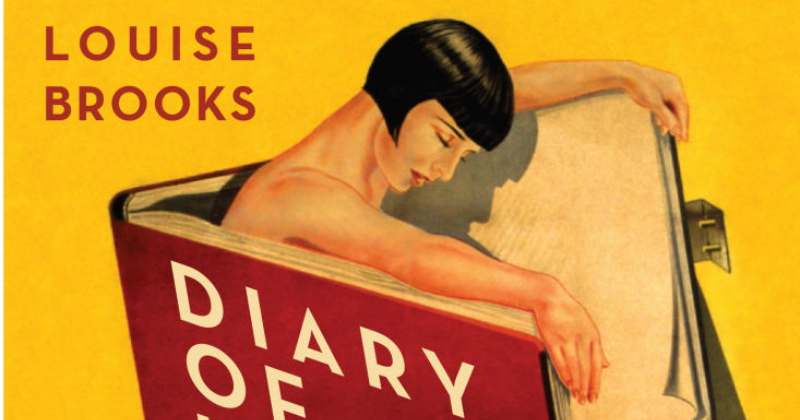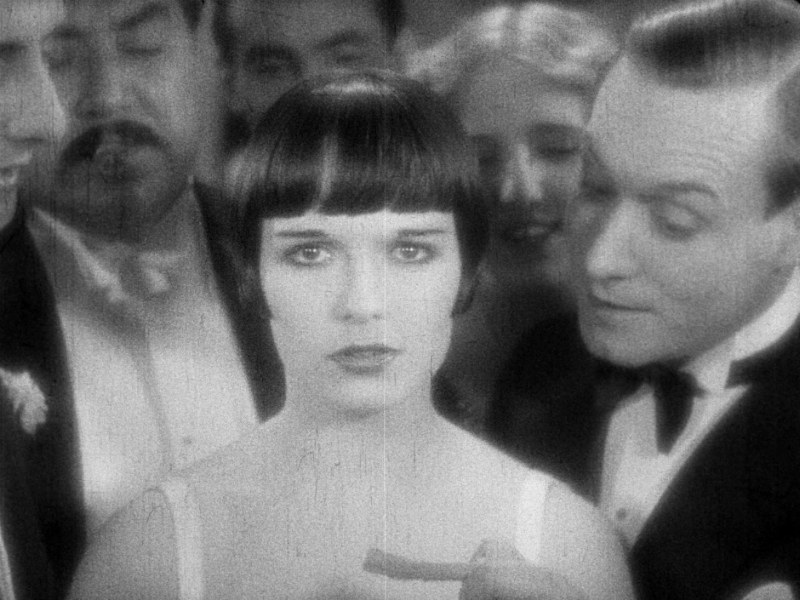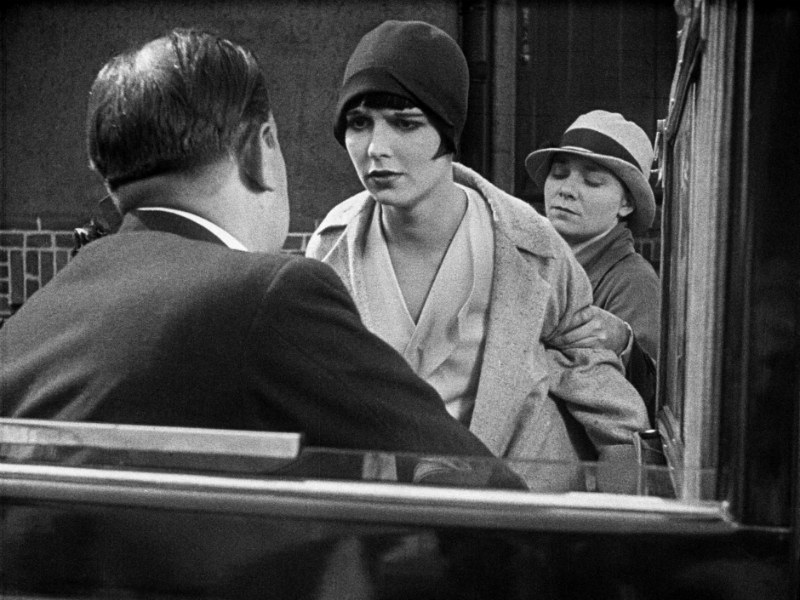
Diary of a Lost Girl begins in the midst of tragedy. As Thymian (Louise Brooks) awaits her confirmation, eager for all the joys of adulthood, her family’s housekeeper is suddenly thrust out. It seems she and Thymian’s father had been sleeping together, and a pregnancy resulted. Adult life suddenly seems a great deal more complicated. She looks to her father’s assistant for comfort. Instead, he rapes her and impregnates her. Her family urges their marriage. She refuses, and is sent to a reformatory.
Matters do not improve for her.
At the conclusion of the film, a character calls for a little more love and understanding, so that such fates as the one Thymian experiences do not befall others. Pabst reportedly wanted a somewhat bleaker, or at the very least, less moralistic, ending. The resulting one is, after all, deeply woven into the fabric of his film; few could emerge from such a story without a deep sense of empathy for Thymian. Brooks carries the weight of her character’s experiences as though perpetually in shock that she even ended up in them. The sort of stock joke about silent performers is that they overact everything, but Brooks seemed to have a natural sense of how much the camera could perceive, or perhaps how her countenance could be employed to convey so much. Here she was, a young girl, on the day of her confirmation, and all she did along the way was tell the truth and stand up for herself. Pabst underscores this by, just before he fades out as Thymian is about to be raped, he freezes on a frame for less than a second – this moment caught in time, forever chaining Thymian to the actions of another, making her victimhood an inextricable part of her. Brooks lets that essential truth carry the entire picture. She doesn’t have to remind you how she’s suffered; we’ve seen her suffer. And we’ll let that suffering inform every scene.

It’s easy to read this film purely as a protest against the patriarchy, especially these days, when the designs of such systems are more readily apparent and discussed. But this is part of what made the classical cinema so radical. The term “patriarchy” was not widely used to define social systems in these days, but still Pabst, novelist Margarete Böhme (who wrote the novel upon which the film was based), and screenwriter Rudolf Leonhardt seem to have seen clear through it. Even the film’s ending, though it places Thymian in more comfortable circumstances than originally intended, makes her dependent upon male power to do so, condemning Thymian to a life of restricted comfort, forever relying on a man’s generosity. He may very well leave her to her own passions and interests; he may not. And she’ll always have to wonder if he will.
It’s gotten to the point, now, whenever a German silent film comes to Blu-ray from Masters of Cinema, that I’ll just expect greatness in presentation. I’ve yet to be disappointed. Diary of a Lost Girl went through a hell of a time in its initial exhibition, so thoroughly censored that the version that exists today represents a gathering of so many disparate elements that it may, itself, remain incomplete. At the very least, we’re left with an image quality that varies wildly; some sections are heavily damaged, others quite pristine. What remains is preservation house Murnau-Stiftung’s typical commitment to the depth and dimension of the image (they worked alongside The Fondazione Cineteca di Bologna, the Deutsche Filminstitut – DIF, and Frankfurt am Main to restore the film), bringing to great clarity of what can be seen. Contrast is uniformly excellent, crafting a bold image that still gives plenty of detail in darker scenes, and is downright luminous when certain bits of light are meant to emit towards the audience.

The supplements are limited, but really worthwhile. First, David Cairns edited a video essay – narrated by Fiona Watson – titled Naked on My Goat, named after an autobiographical novel Louise Brooks wrote and immediately burned (Brooks’s life following her acting career is endlessly fascinating, culminating as it does with a tenure as a film scholar). This focuses on her most famous years as an actress, and success in Germany. It runs only twelve minutes, but provides a peek into the life of one of the screen’s most interesting actresses.
Even better is the 48-page booklet featuring several essays. The first, a 2007 essay by R. Dixon Smith, provides an overview of the film, Brooks, and Pabst, focusing on the film’s sexuality and impact. The second, a 1982 essay by Louella Interim, gets into more of the thematic elements of class and gender dynamics, as well as how Pabst expresses these through his images. The third, and possibly most interesting, is a 1967 piece by Lotte H. Eisner, recounting her encounters with Pabst over the years, from his time as a top director in the one of the world’s most prominent film industries, to his time as an exile in Paris, to his even more controversial time after the war, when he was suspected of having collaborated with Nazis, to his eventual resignation that his time at the top (of the industry, of his talents) had been brief, and fleeting. It’s only a couple of pages, but it provides a very moving portrait of an artist. Next, we get a short excerpt from her memoir, Lulu in Hollywood, and an excerpt from a letter she wrote to theatre critic Kenneth Tynan in 1979. Finally, MoC producer Craig Keller wrote a long, personal, engaging poem, about the effect of seeing her onscreen. All in all, it’s everything I love about MoC’s booklets – bold, actively engaged, and challenging.
Diary of a Lost Girl is a major work of cinema, one of the defining entries in the filmographies and biographies of both its director and star. I’m extraordinarily pleased that it is now available on Blu-ray, especially in so fine and well-considered an edition.



![Bergman Island (The Criterion Collection) [Blu-ray]](https://criterioncast.com/wp-content/uploads/2022/11/bergman-island-the-criterion-collection-blu-ray-400x496.jpg)
![This Is Not a Burial, It’s a Resurrection (The Criterion Collection) [Blu-ray]](https://criterioncast.com/wp-content/uploads/2022/11/this-is-not-a-burial-its-a-resurrection-the-criterion-collection-blu-ray-400x496.jpg)
![Lars von Trier's Europe Trilogy (The Criterion Collection) [The Element of Crime/Epidemic/Europa] [Blu-ray]](https://criterioncast.com/wp-content/uploads/2022/11/lars-von-triers-europe-trilogy-the-criterion-collection-the-element-of-400x496.jpg)
![Imitation of Life (The Criterion Collection) [Blu-ray]](https://criterioncast.com/wp-content/uploads/2022/11/imitation-of-life-the-criterion-collection-blu-ray-400x496.jpg)
![The Adventures of Baron Munchausen (The Criterion Collection) [4K UHD]](https://criterioncast.com/wp-content/uploads/2022/11/the-adventures-of-baron-munchausen-the-criterion-collection-4k-uhd-400x496.jpg)
![Cooley High [Criterion Collection] [Blu-ray] [1975]](https://criterioncast.com/wp-content/uploads/2022/11/cooley-high-criterion-collection-blu-ray-1975-400x496.jpg)